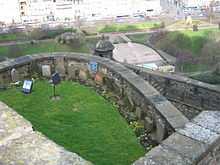Pet cemetery
A pet cemetery is a cemetery for animals.


History


London's Hyde Park was the site of an informal pet's cemetery between 1881 and 1903 in the gatekeeper's garden.[2] From the first burial of "Cherry" until its official closure in 1903, it received 300 burials with miniature headstones,[3] with a final special burial of the Royal Marines mascot dog "Prince" in 1967.[4] Cimetière des Chiens in Asnières-sur-Seine in Paris, dating from 1899, is an elaborate, sculpted pet cemetery believed to be one of the first public zoological necropolis in the world.[5] America's largest and oldest pet cemetery is in Hartsdale, New York. It dates from 1896 when a vet working out of Manhattan offered to let a grieving pet owner bury her dog in his hillside apple orchard. Today it is the final resting place for more than 70,000 animals.[6]
Burial options

Pets and other animals to which people are emotionally attached are often ceremonially buried. Most families bury deceased pets on their own properties, typically in the yard. Pet cemeteries offer single and multiple plots options. A specially designed pet casket or vault may be used. In cremation, the remains can be saved in an urn, buried, or scattered. In a memorial cremation, several pets are cremated together. The resulting cremated remains are then scattered on the cemetery grounds. In most cases pet cemeteries will have a chapel, and there will be facilities to hold either a non-denominational Christian or, alternatively, a non-religious ceremony.
In January 2010, West Lindsey District Council gave permission for a site in the village of Stainton by Langworth where animal remains can be interred alongside human remains as part of a "green burial" site, making it the first place in England where pets could be buried alongside their owners.[7]
American art collector Peggy Guggenheim is buried alongside the grave of her dogs on the grounds of her home, the Palazzo Venier dei Leoni (Now the Peggy Guggenheim Collection, an art museum on the Grand Canal in Venice, Italy).
| Wikimedia Commons has media related to Pet cemeteries. |
See also
References
- ↑ Why are hundreds of dogs buried at Ashkelon
- ↑ The Victorian Pet Cemetery of Hyde Park
- ↑ The Pet Cemetery of Hyde Park London insight Blog, 6 October 2010
- ↑ Hyde Park Pet Cemetery London 365, 11 November 2012
- ↑ A tour of Parisian pet cemetery Cimetière des Chiens
- ↑ Apple orchard that became New York's famous Hartsdale Pet Cemetery
- ↑ "Pet lovers can be buried with their animals", Sunday Express, accessed 25 January 2010
External links
- International Association Of Pet Cemeteries & Crematories
- Interfaith Association of Animal Chaplains
- Virtual Pet cemetery
- Pet Cemeteries - slideshow by Life magazine
- Pet Cemetery Directory - for pet cemeteries across the US and Canada
- Pet Cremation Urns